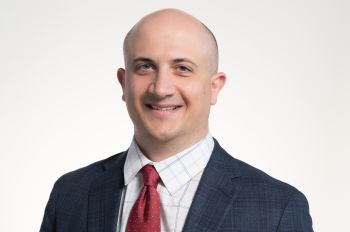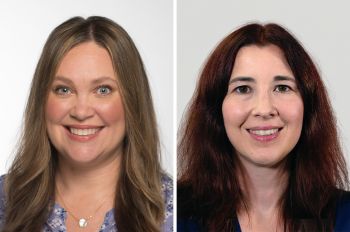Summer 2019 Armour R&D Expo Unveils Students’ Innovative Thinking
Armour College of Engineering hosted the Summer 2019 R&D Expo on Thursday, July 18, showcasing the work of undergraduate engineering students from the Armour R&D Summer Research Immersion Program, in addition to eight students who were awarded summer 2019 Armour R&D fellowships with their faculty mentors.
This eight-week summer immersion program offers students the opportunity to gain hands-on research-and-development experience in faculty-led laboratories. During the expo students shared research results with peers faculty, and alumni through poster presentations covering a diverse range of engineering topics, from the development of camera livestreaming for Internet of Things (IoT)-based home automation, to the exploration of a curative drug for Alzheimer’s disease, and the design of a specialized glove to reinforce muscle activities in the hands of stroke survivors.
Emma Farquharson (CHE 2nd Year) and Sohail Murad, professor and chair of the Department of Chemical and Biological Engineering, worked together on the project titled “The Economic and Energy Analysis of Desalinization Processes in Central America.” As a result, Farquharson discovered that setting up a solar desalination station is a self-contained and inexpensive solution for transporting 100 liters of fresh water a day into areas where fresh water is scarce.
She explains, “An estimated 780 million people worldwide don’t have access to fresh water. However, nearly 40 percent of the world’s population live within 100 kilometers of a coast. Therefore, the applicability of sea water desalination to meet fresh water needs is important.” Farquharson says that she would like to help the world through desalinization systems by finding the most feasible way to provide clean water to people of Central America. “This project reinforced my interest in helping to provide safe drinking water to communities that need it,” adds Farquharson.
Michael Hu (ECE 4th Year) and Jafar Saniie, chair of the Department of Electrical and Computer Engineering and the Filmer Chair Professor of Electrical and Computer Engineering, collaborated on the project titled “Computer Vision-Based Robotic Arm.” Hu shares, “During my meeting with Dr. Saniie, he directed my attention to the types of robotic arms that were implemented in metal-cutting factories. The high precision and time efficiency of these robotic arms really fascinated me because it’s hard to imagine that someone could control and command something so accurate and fast.”
Prior to Armour’s summer immersion program, Hu had never tried to implement computer vision. “During my research I had to analyze and control how each motor and joint moved in the robot. I also had to learn how to apply inverse kinematics to get the robot to move,” says Hu.
He adds, “Currently my project can only distinguish between nuts, bolts, and their individual color. In the future, the ability to control the arm remotely would also increase the amount of flexibility users would have when controlling the arm.”
Hu says that the best part of the program has been working with fellow researchers, which has helped to motivate him. “I've talked to many people who also have an interest in robots, and their personal projects really motivate me to start some personal projects of my own,” says Hu.
Victor Quiroz (BME 3rd Year) and Georgia Papavasiliou, associate professor of biomedical engineering, explored the topic of “Novel 3D Scaffold with Peptide Ligands for the Promotion of Chondrocyte and Osteoblast Differentiation of MCSs.” The purpose of this research was to optimize the concentration of peptides to maximize differentiation and encourage stem cells to become bone and cartilage cells. Quiroz explains, “The goal was to find the optimal ratio of these variables while exploring the structural characteristics of new gels.”
Quiroz says that after conducting this research he has a deeper understanding of how stem cells react to different material properties. He shares, “Initially I was just looking to get a feel for research and to be 100 percent sure that I wanted to pursue graduate school. I was very interested in studying medical devices, but now I’d really like to focus my grad studies on medical device materials and how they interact with the body.”




